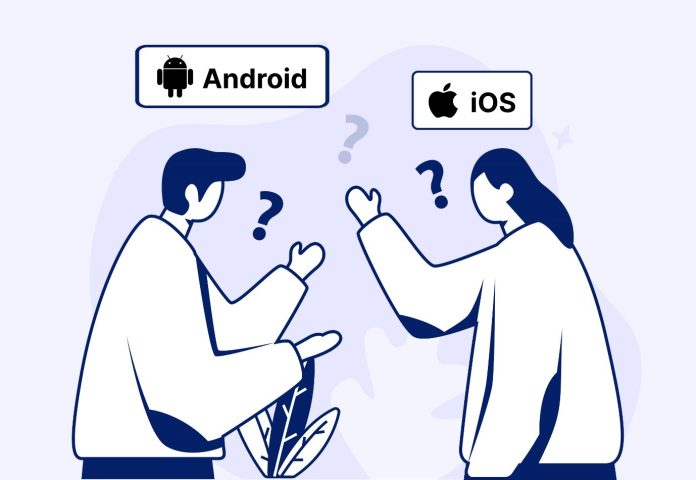In today’s world, mobile applications have become an integral part of our daily lives. They help us stay connected, stay organized, and stay entertained. However, when it comes to developing mobile applications, there are two dominant platforms: iOS and Android.
As an app developer or business owner, choosing between iOS and Android can be a daunting task, as each platform has its own set of pros and cons. In this blog, we will explore the key differences between iOS and Android app development and help you make an informed decision on which platform is the best fit for your needs.
So, let’s dive in and explore the world of iOS and Android app development!
What is iOS mobile app development?
Let’s start with iOS mobile app development first. The term iOS app development pertains to the creation of mobile applications designed specifically for Apple’s mobile operating system. These apps are intended to function on various Apple devices such as iPhones, iPads, and iPod Touch.
Apart from that Apple also offers numerous operating systems for its various devices. For instance, apps built for Mac computers run on macOS.
The development of iOS is designed to meet the specific device specifications and security standards of Apple’s mobile operating system.
What is Android app development?
On the other hand, Android mobile app development is the process of building applications that run on the Android operating system.
Google’s developed operating system comes with a long list of devices that use Android OS. Some of the well-known brands are Samsung, OnePlus, Nokia, and more.
Pros and Cons of Android and iOS Mobile App Development
Pros of Android app development
Large market share
Android has a larger market share compared to other mobile operating systems, making it an attractive platform for developers to reach a wider audience.
Open-source platform
Android is an open-source platform, which means developers have access to the source code and can customize it according to their requirements.
Easy to learn
Android app development is relatively easy to learn, especially for developers who have experience with Java programming language.
Easy deployment
Android apps can be deployed easily on the Google Play Store, which provides a wide reach to potential users.
Multiple distribution channels
In addition to Google Play Store, developers can distribute their Android apps through third-party app stores and their websites, which gives them more control over the distribution of their apps.
Integration with Google services
Android apps can easily integrate with various Google services, such as Google Maps, Google Drive, and Google Analytics, which can enhance the functionality of the apps.
Customization options
Android offers more customization options than other mobile operating systems, which can help developers create unique and innovative apps.
Cons of Android app development
Fragmentation
Android is a fragmented platform with various device manufacturers and versions of the operating system in use. This can make it difficult to ensure that apps work correctly across all devices.
Security concerns
Android has been known to have security issues due to its open-source nature, and users may be more vulnerable to malware and other cyber threats.
Testing challenges
Testing Android apps can be more time-consuming and difficult than testing apps for other platforms due to the variety of devices and operating system versions.
Monetization difficulties
While Android has a large market share, it can be more challenging to monetize apps on the platform compared to other platforms due to a lower willingness to pay among Android users.
User experience inconsistencies
With so many different Android devices and versions of the operating system, it can be difficult to ensure a consistent user experience across all devices.
App discovery challenges
With so many Android apps available, it can be challenging for new apps to get discovered and gain traction among users.
Pros of iOS mobile app development
High-quality user experience
iOS devices are known for their high-quality user experience, and this translates to the apps developed for the platform. Developers can take advantage of the platform’s design guidelines and tools to create apps that are aesthetically pleasing and intuitive to use.
Better security
iOS has a reputation for being more secure than other mobile operating systems due to its closed-source nature and strict app review process. This can be especially important for apps that handle sensitive data or transactions.
Consistent user experience
Because there are fewer devices and versions of iOS in use compared to Android, it is easier to ensure a consistent user experience across devices.
High-value users
iOS users tend to be more engaged and have higher incomes, which can make them more valuable targets for app developers looking to monetize their apps.
Easy app deployment
Apple’s App Store has a straightforward app submission process and a rigorous app review process that can help ensure app quality and security.
Better monetization opportunities
iOS users are generally more willing to pay for apps and in-app purchases compared to Android users, which can make it easier for developers to monetize their apps.
Strong developer support
Apple provides strong developer support with extensive documentation, development tools, and resources to help developers create high-quality apps.
Cons of iOS mobile app development
High development costs
Developing iOS apps can be more expensive than developing for other platforms due to the need for specialized hardware, software, and development tools.
Apple’s strict guidelines
Apple has strict guidelines for app development and review, which can make it more challenging for developers to get their apps approved for the App Store.
Limited customization options
Apple’s design guidelines and restrictions can limit the customization options available to developers, which can make it more difficult to create unique and innovative apps.
Limited market share
While iOS devices are popular among certain demographics, such as affluent consumers, the market share for iOS devices is lower compared to Android devices, which can limit the reach of iOS apps.
Closed ecosystem
iOS devices and apps are part of a closed ecosystem that is tightly controlled by Apple, which can limit the flexibility and freedom of developers and users.
Limited hardware options
Unlike Android devices, there is limited hardware diversity within the iOS ecosystem, which can limit the range of capabilities available to developers.
App discovery challenges
With so many iOS apps available on the App Store, it can be challenging for new apps to get discovered and gain traction among users.
Key Differences Between Android vs iOS Mobile App Development
Design Strategy
The first thing you will notice between the two is some crucial differences in the ways apps are designed.
When it comes to the design strategy, Apple prioritizes app content over design, which is why they utilize more white space to emphasize app-specific features and enhance clarity. iOS developers are advised to consult Apple’s Human Interface Guidelines to ensure they adhere to the recommended practices.
When creating designs for Android devices, you will have greater flexibility to modify colors, incorporate motion, and adjust lighting compared to iOS devices. The design guidelines for Android are not as rigidly enforced.
Programming language
Both these mobile app developing platforms use different backend tech stacks.
The two primary programming languages utilized for coding iOS applications are Swift and Objective-C. Swift is purposefully developed for Apple products and is primarily utilized for iOS development, rather than for other purposes.
Integrated Development Environment (IDE)
Android mobile app developers use Android Studio to build apps. And that is the official IDE for Android app development. Android Studio is built on IntelliJ IDEA software that is available for Linux, Windows, Chrome, and macOS operating systems.
On the other hand, iOS mobile app developers opt for Xcode which is Apple’s official IDE. With the help of this IDE, iOS developers can develop apps for iOS, macOS, iPadOS, tvOS, and watchOS.
Xcode is exclusively compatible with macOS, which means that it cannot be downloaded on Linux or Windows machines, unlike Android Studio.
Which IDE is better for your next mobile app development?
Every software has its advantages and disadvantages. Android Studio is relatively more versatile for developers who possess prior experience in building apps for different operating systems. However, Xcode is simpler to configure for beginners.
What to choose between Android and iOS mobile app development?
In this Android apps vs. iOS apps development comparison, you may have already deduced that the answer to this question is reliant on your project’s particular needs.
As a result, it is advisable to review your business objectives, target audience needs, development costs, time constraints, and potential obstacles before commencing the mobile app development process.
No matter which side you take in this definitive comparison between Android apps and iOS apps development, employing a proficient mobile app development company will undoubtedly improve your chances of achieving success.
About Author –
Mitul Patel Founder & CEO at Bytes Technolab Inc. with a demonstrated history of scaling up the company in the ever-competitive Software Industry. An elite mentor & problem-solver to a dev team of 120+ software experts. A growth strategist and dynamic tech consultant helping global clients to scale up their businesses.
I Have 17+ years of experience. My colleagues in the leadership team are like-minded with ONE GOAL – to use our expertise in web, eCommerce, and mobile app spaces to deliver digital excellence for global startups, SMEs, enterprises, and Fortune 500 brands. To serve at a global level, we have registered offices in the USA, Canada, and India.
Our clientele encapsulates 500+ clients from 30+ countries. I have consulted 150+ Clientele that also includes Fortune 500 Companies.
Also, I am having Experience in serving end-to-end Software Solutions, especially into the Retail/eCommerce Industry. I have been an integral part of 50+ B2B, B2C, B2B2C eCommerce projects with a Strong Technical Knowledge of Building Digital eCommerce Infrastructure. This makes me the perfect growth hacker for my global clientele.






